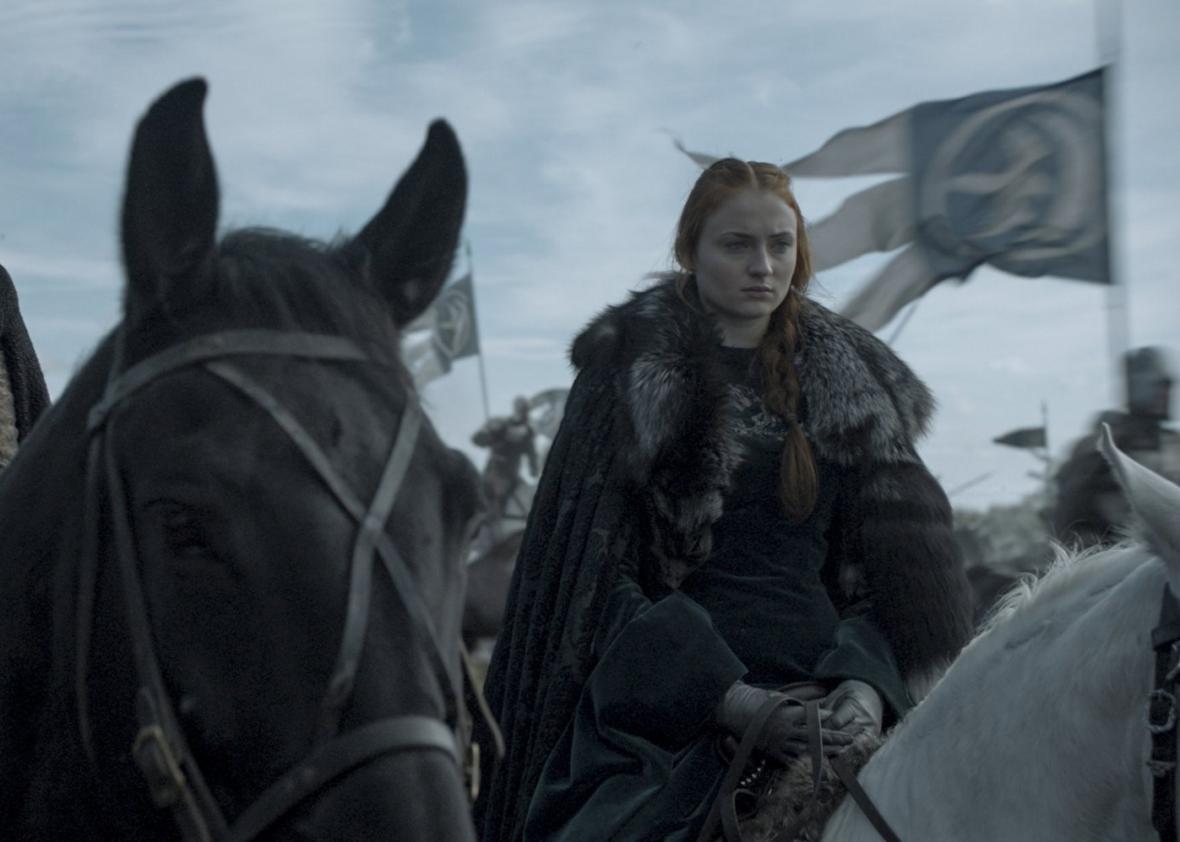In a few short seasons, Sansa Stark (–Lannister Bolton, if you want to be precise) has transformed from one of Game of Thrones’ most overshadowed characters to a fan favorite, especially among younger female viewers. Bullied by Cersei and Joffrey, married off to two men she despised (one of whom was a sociopathic sadist), and mentored, whether she liked it or not, by Littlefinger, who has redirected his obsessive love for her late mother toward her, Sansa has suffered as much as most major characters in the series and has seldom been more than a pawn in someone else’s game. Fans are eager for the eldest surviving Stark child to claim her day in the sun, and perhaps the throne of Winterfell.
What Sansa herself wants is difficult to say. She has destroyed Ramsey and helped the man she believes to be her half-brother retake Winterfell, but unlike Cersei, she’s never given any sign of wanting to rule herself. For a long time, Sansa was one of the most hated characters in George R.R. Martin’s books—after the villains, of course—because readers found her initial naive romanticism—and, later, her numbed passivity—annoying. I like a kickass heroine as much as the next person, but to me this is what makes Sansa one of the most interesting figures in the books: She is simply an average woman of her class, without special powers or vaunting ambitions, caught up in palace intrigues and historic upheaval. She expected nothing more from life than to marry a strong, handsome knight and have a castle full of kids, and instead she got the trials of Job.
Marriage and motherhood remain Sansa’s most probable fate, and though viewers might not like that, Sansa herself is wised-up enough to know it. Why did she wait so long to call in Littlefinger’s troops from the Vale in last week’s Battle of the Bastards? Why didn’t she tell Jon that a decisive number of non-Northern fighters were available to him? She hasn’t yet fully explained herself, but chances are she realized the likely price of Littlefinger’s assistance: her hand. Perhaps she feared Jon would pressure her to agree to it in advance. Only when all other possibilities failed did she place herself in Littlefinger’s debt.
No one could blame Sansa if she preferred never to marry again. As the savants of House Slate have pointed out, the traumatic experiences she’s endured over the course of the series have accentuated a resemblance to Cersei, who was also trapped in one loveless political marriage and nearly forced into a second one by her father after Robert Baratheon’s death. But Sansa doesn’t have Cersei’s mulish, resentful hunger for power. Thanks to Littlefinger’s tutoring, she’s probably also shrewder than Westeros’ new leather queen, as well. (Not that topping Cersei’s brainpower would be all that difficult. Olenna Tyrell was right to marvel at her stupidity.)
Maybe Sansa is even as astute as Daenerys, who bid farewell to her sellsword boyfriend Daario with the knowledge that she’ll almost certainly have to marry politically to conquer and keep Westeros. Unlike Cersei, Dany understands that being in charge doesn’t mean that you get to do whatever you want; it just subjects you to a different set of obligations.
It would be smart of Sansa to marry Littlefinger, if she can stand it. She and Jon need his military, tactical, territorial, and political support. This is upsetting for many fans to contemplate, because they like Sansa and want to see her paired off with someone she loves and respects. But Sansa is a princess, not a junior marketing executive at Viacom, and part of the deal that comes with the privileges of her position is that you never really get to marry for love. If you’re lucky, like Dany, you recognize this, and can have some say in the marital partnerships you form—most female aristocrats in the Middle Ages did not—but it will always be primarily a public rather than a private affair.
Marrying and having kids is Sansa’s job, the designated role of a woman of her class. If that sounds cold, consider the nature of the princessing profession overall. You get to be special and sought after, to live comfortably in a world of want, wear pretty clothes, and go to splendid parties—all because you happen to be a particular person’s daughter. That, after all, is the root of any claim Sansa has on the Northern throne: her blood. She hasn’t earned it, however much her ordeals and growing toughness have endeared her to fans. But blood and tradition mean a lot to the Northerners, people cast as honest, unfancy, rather primitive folk compared to the subtle, intriguing cosmopolitans of King’s Landing. (So does prowess on the battlefield, which is why they rally so quickly to Jon, his mismanagement of the Battle of the Bastards notwithstanding.)
A girl can’t have it both ways, enjoying the prerogatives of the nobility while conducting her love life like a commoner. Her marriage could cement peace in a war-wracked country and her children could embody stability and continuity of leadership for years to come. Sansa Stark’s brother, Robb, tried to buck this system and still hold on to his kingship all the way back in Game of Thrones’ second and third seasons, and look where that got him. Let’s hope Sansa has learned from his mistake.
